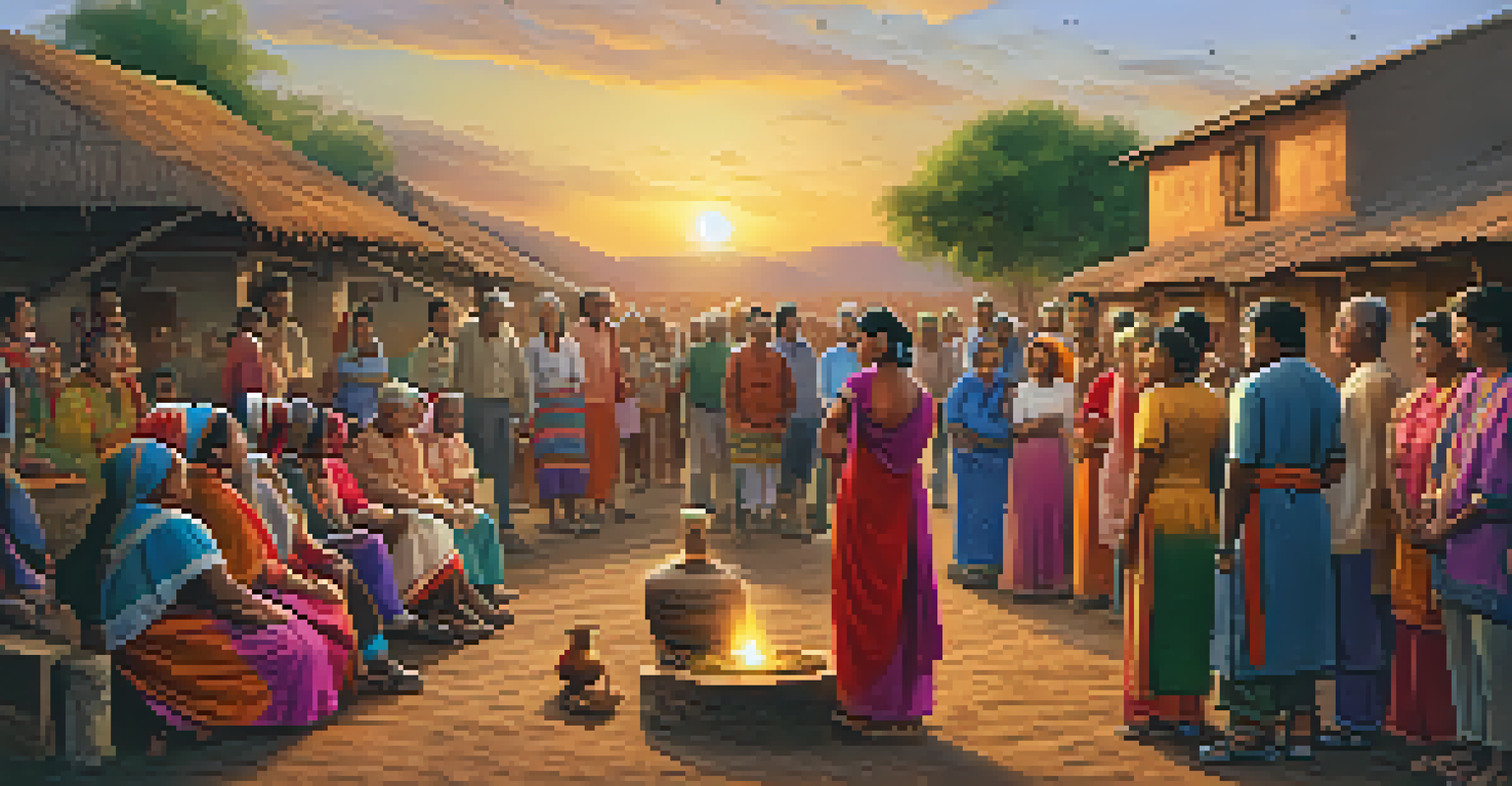The Role of Ancestor Worship in African Spirituality

Understanding Ancestor Worship in African Cultures
Ancestor worship is a central practice in many African cultures, reflecting a deep respect for those who came before us. This spiritual tradition emphasizes the belief that ancestors continue to influence the lives of their descendants. In various communities, honoring ancestors is seen as a way to maintain a connection between the living and the deceased, ensuring that wisdom and guidance are passed down through generations.
We are not just our ancestors' descendants. We are also the ancestors of those who will come after us.
Practices can vary widely, from offerings of food and drink to elaborate ceremonies celebrating an ancestor's life. These rituals serve not only to honor the dead but also to invoke their presence in daily life. By recognizing their ancestors, individuals often seek blessings, protection, and advice from those who have experienced life's challenges before them.
For many, ancestor worship is more than just tradition; it’s a vital aspect of their identity and community cohesion. This connection to ancestors fosters a sense of belonging and continuity, reinforcing the values and teachings that shape cultural identities. Thus, ancestor worship remains a dynamic and integral part of African spirituality.
The Spiritual Significance of Ancestors
In African spirituality, ancestors are viewed as spiritual guardians who possess wisdom and insight. They are believed to watch over their descendants, guiding them through life's trials and tribulations. This belief instills a sense of responsibility among the living to honor and remember their ancestors, reinforcing the notion that life is a continuum.

Spiritual practices such as prayers and rituals are often directed toward these ancestors, seeking their guidance and intervention in personal and communal matters. For instance, during significant life events like weddings or births, families may invoke their ancestors' blessings to ensure prosperity and happiness. This connection to the spiritual realm helps individuals feel supported and understood.
Ancestor Worship's Cultural Importance
Ancestor worship is a vital practice in African cultures, fostering community identity and continuity through honoring those who came before.
The reverence for ancestors also reinforces moral values within communities, where behaviors are shaped by the desire to make ancestors proud. This moral compass guides individuals in their daily lives, encouraging them to act in ways that align with the legacy of their forebears. As such, the spiritual significance of ancestors transcends mere memory; it actively influences ethical living.
Rituals and Practices of Ancestor Worship
Rituals surrounding ancestor worship can be both elaborate and deeply personal. Common practices include setting up altars adorned with photographs, offerings, and symbols that represent the ancestors' lives and legacies. These altars serve as focal points for spiritual communication, where individuals can express their thoughts, desires, and gratitude.
The past is never dead. It's not even past.
Family gatherings during significant times, such as harvest festivals or memorial days, often involve collective remembrance of ancestors. These events strengthen communal ties while reinforcing the shared heritage and values that ancestors have passed down. Through storytelling and reminiscence, families weave the past into the present, maintaining a vibrant connection to their lineage.
Additionally, modern adaptations of these rituals can be seen as younger generations blend tradition with contemporary practices. Whether through digital memorials or new forms of storytelling, the essence of ancestor worship evolves while retaining its core significance. This adaptability ensures that the spiritual connection remains relevant and impactful across generations.
The Role of Ancestor Worship in Community Identity
Ancestor worship plays a pivotal role in shaping community identity across various African cultures. By honoring their ancestors, communities reinforce shared values and collective memory, fostering a sense of belonging and unity. This connection to the past helps individuals understand their place within the broader tapestry of their culture.
In many societies, the practice of ancestor worship also serves as a social glue, strengthening relationships among community members. Celebrating communal rituals allows individuals to come together, share stories, and collectively honor those who have shaped their history. This shared experience cultivates a sense of solidarity and mutual respect.
Spiritual Connection with Ancestors
Ancestors are viewed as spiritual guardians, providing guidance and moral values that influence the lives of their descendants.
Moreover, the identity forged through ancestor worship often influences community decisions and leadership structures. Elders, seen as custodians of ancestral wisdom, often guide communal affairs, ensuring that traditions are upheld. This intertwining of spirituality and community governance highlights the importance of ancestral ties in shaping contemporary social dynamics.
Challenges Facing Ancestor Worship Today
Despite its enduring significance, ancestor worship faces challenges in the modern world. Globalization, urbanization, and the spread of Western ideologies have led to a decline in traditional practices. Many younger individuals, influenced by contemporary lifestyles, may feel disconnected from their ancestral roots, leading to a gradual erosion of these vital traditions.
Additionally, societal changes and economic pressures can make it difficult for families to engage in traditional rituals. The fast-paced nature of modern life often leaves little time for communal gatherings or elaborate ceremonies. This shift poses a risk of losing valuable cultural heritage and the teachings that ancestors imparted.
However, many communities are finding ways to adapt and preserve their practices. By integrating technology and modern communication methods, they are reimagining how to honor their ancestors. This resilience demonstrates the adaptability of ancestor worship, ensuring that it remains a vital part of cultural identity in a rapidly changing world.
The Interplay of Ancestor Worship and Modern Spirituality
In recent years, there has been a notable resurgence of interest in ancestral practices among younger generations. This revival reflects a broader trend of seeking authenticity and connection to cultural heritage in an increasingly globalized society. Many are exploring their roots, recognizing that ancestor worship can enrich their spiritual lives.
Modern spirituality often seeks to blend traditional beliefs with contemporary practices, creating a unique tapestry of faith. People may incorporate ancestor veneration into diverse spiritual paths, finding meaning in the wisdom of their forebears. This fusion allows individuals to honor their lineage while exploring new dimensions of spiritual expression.
Modern Adaptations of Traditions
Despite challenges from globalization, communities are finding innovative ways to preserve and adapt ancestor worship practices for future generations.
As communities navigate this interplay between tradition and modernity, the role of ancestors remains significant. This blending of old and new not only preserves cultural practices but also revitalizes them, ensuring that they resonate with contemporary values. The future of ancestor worship appears promising, as it continues to adapt and thrive in the hearts of those who seek connection to their past.
Conclusion: The Enduring Legacy of Ancestor Worship
In conclusion, ancestor worship holds a profound place in African spirituality, serving as a bridge between the past and present. It fosters community identity, guides personal values, and enriches spiritual understanding. The rituals and beliefs surrounding ancestors provide a framework for individuals to navigate life's complexities, drawing strength from their heritage.
Despite the challenges posed by modernity, the essence of ancestor worship remains resilient. Communities continue to adapt their practices, ensuring that the wisdom of their ancestors is honored and preserved. This dynamic relationship with the past not only shapes cultural identity but also fosters a sense of connection and continuity among generations.

Ultimately, the enduring legacy of ancestor worship lies in its ability to inspire, guide, and unite people across time and space. As long as there are stories to tell and memories to cherish, the practice will continue to thrive, reminding us of the importance of honoring those who have come before.